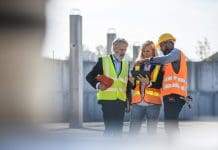Construction is facing big questions about productivity and sustainability. How it responds will define the future of the industry and the future of the planet. David Wigglesworth, managing director at SFS UK, the global leader in building envelopes, looks at what the sector can do to safeguard the future and deliver a sustainable built environment
The noise around COP26 has reinforced what we’ve all known for years: our environment is in trouble, our futures are threatened and the time has come for action, not words. Everybody needs to take responsibility: individuals, government, industry and, of course, construction. Construction especially, if we are to safeguard a more sustainable built environment.
Everyone from the US Green Building Council to the United Nations Environmental Programme agrees. Construction is responsible for 40% of the world’s energy
usage, 25% of water usage and around 33% of greenhouse gas emissions.
This is a heavy charge sheet and if we’re going to secure the future of our planet, a lot of work needs to be done. Not least because the world is on the threshold of a construction boom. In the UK alone, some £650bn has been earmarked for economic and social infrastructure projects over the next 10 years, taking in schools, hospitals, transport links, entertainment, office buildings and homes as the government sets out to transform lives and level up society.
The direction of travel is clear, but construction has been notoriously slow to get the wagons rolling. Research shows that productivity in construction has grown only 1% over the last 20 years, far lower than other industries.
Equally, there’s a real shortage of labour, exacerbated by Brexit, an ageing workforce and a poor image which is deterring millennials and Gen X. This is a pressing issue. In 2021, the Construction Skills Network revealed the need for 217,000 new workers by 2025, which has encouraged a flurry of activity in terms of apprenticeships, upskilling and retraining.
Major manufacturers such as SFS are taking this responsibility seriously and their efforts cover four main areas: sustainability, digital, productivity and people. As their efforts will help safeguard the future of a sustainable built environment, it’s worth looking at each of these a little more closely.
‘Go green’ initiatives: towards the concept of embedded carbon
Today’s tenders seek more sustainable products and technology, and recycling, upcycling and cradle-to-cradle design have become part of construction’s lexicon. Manufacturers are responding.
At SFS, for example, ‘go green’ initiatives touch on everything from lighting solutions and manufacturing with 100% recycled material through to insulation which improves the thermal performance of rainscreen subframes.
There’s no doubt that large manufacturers have a role to play here. As an example, SFS is part of the UN Global Compact, which supports the principle of introducing Approved Documents to cap embodied carbon emissions on all major construction projects.
Equally, it has signed up to the BRE’s EPD scheme, including deploying BRE’s online tool, LINA, which provides a consistent, scientific base for measuring embodied carbon. SFS is currently verifying its NVELOPE® subframe systems before rolling it out to other products. Such initiatives, when widely adopted, will bring transparency into tomorrow’s supply chain.
Fasteners can create more efficient working
As a global building envelope specialist, the focus for SFS is on roofs and rainscreen
cladding, so critical to many current projects. As an example, there’s a major UK drive to refurbish older schools, 66% of which were constructed before 1976. Simply fitting on to the existing structure, cladding can improve both the aesthetics and thermal performance of the building without running up the huge costs involved in demolition and rebuilding. Giving buildings a second life is also a key tenet of sustainable construction.
Additionally, speedily installed roofs and rainscreen systems secure the building envelope at an early stage, protecting the asset while enabling work to continue inside. Here, simple products such as time-saving fasteners can help improve installation speeds.
Using smart tools to streamline specification
Manufacturers are responsible for developing these tools and making them available to the market. One such example is SFS’ ConnectSuite, an online portal we are developing, which will host a variety of smart tools to help streamline product selection, specification and design.
For example, NVELOPE® Project Builder for rainscreen subframes systems generates key engineering calculations, as well as providing component guides and list prices, NBS specifications and 3D modelling of thermal point loss areas. By ensuring an efficient build today, digital has a key role in building for tomorrow.
Create a sustainable built environment to safeguard the future of people
The growing skills shortage is a threat to our whole industry and the pressure is on to bridge the gap. Everyone can contribute by taking on apprentices, providing ongoing training and making the industry more employee-friendly.
No single organisation can tackle this alone. It demands innovation, commitment and partnerships. In the case of SFS, this has meant forging links with universities to engage earlier with students, as well as developing a range of RIBA-approved CPD modules for architects and specifiers. Delivered through the dedicated SFS academy, other initiatives include training and toolbox talks designed to rapidly improve people’s capabilities.
Construction is key to the future of individuals, communities and the planet, and it needs to create buildings which aren’t just for today, but for generations to come.
By investing in people, digital and more sustainable methods and technologies, major companies like SFS will help those architects and specifiers make more informed choices, deliver more efficient projects and create a sustainable built environment that doesn’t just inspire, but also helps secure everyone’s future.
For more about SFS, please visit https://uk.sfs.com.
Bethany Haller
Wyatt International
bethany@wyattinternational.com
Tel: +44 (0)121 454 8181
Vincent Matthews
SFS
Tel: +44 (0)330 0555 888
*Please note: this is a commercial profile

















